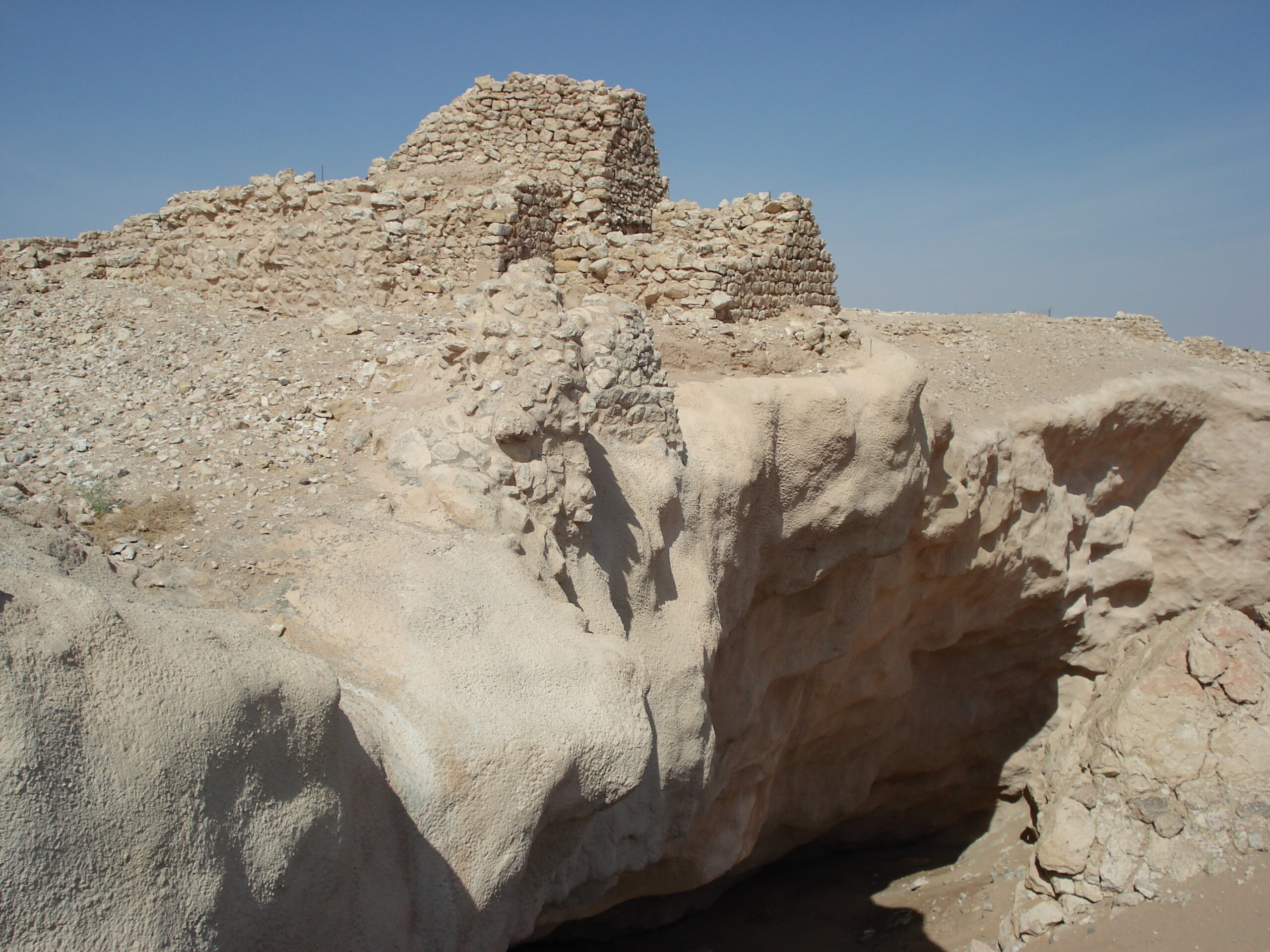Story of Shaddad and His Paradise: Buried in the sands of time is a king who refused to surrender in front of Allah. His name was Shaddad. and He aspired to build Paradise on Earth. People of his time were blessed with way more than we can ever imagine, but the way he, along with his nation, perished is a lesson for all Muslims to remember. Let’s Learn more about the Story of Shaddad and His Paradise.
Table of Contents
ToggleStory of Shaddad and the Irum of the Pillars
Although the story of Shaddad is not mentioned in the Quran, the Irum of the Pillars is mentioned in Quran, Surah 89 (Surah Al-Fajr), Verse 6-13:
أَلَمْ تَرَ كَيْفَ فَعَلَ رَبُّكَ بِعَادٍ
89|6|Have you not seen how your Lord dealt with Aad?
إِرَمَ ذَاتِ الْعِمَادِ
89|7|Erum of the pillars.
الَّتِي لَمْ يُخْلَقْ مِثْلُهَا فِي الْبِلَادِ
89|8|The like of which was never created in the land.
وَثَمُودَ الَّذِينَ جَابُوا الصَّخْرَ بِالْوَادِ
89|9|And Thamood—those who carved the rocks in the valley.
وَفِرْعَوْنَ ذِي الْأَوْتَادِ
89|10|And Pharaoh of the Stakes.
الَّذِينَ طَغَوْا فِي الْبِلَادِ
89|11|Those who committed excesses in the lands.
فَأَكْثَرُوا فِيهَا الْفَسَادَ
89|12|And spread much corruption therein.
فَصَبَّ عَلَيْهِمْ رَبُّكَ سَوْطَ عَذَابٍ
89|13|So your Lord poured down upon them a scourge of punishment.
Who was Shaddad bin Aad?
According to Sura 89 of the Qur’an, Shaddād (Arabic: شدّاد), also called Shaddād bin ʽĀd (شدّاد بن عاد), is believed to have been the ruler of the lost Arabian city of Iram of the Pillars. Shaddad is said to have been the son of ‘Ad al-Miltat ibn Saksak ibn Wa’il ibn Himyar by a number of sources.
Shaddad’s Story in One Thousand and One Nights
The Tales of the Arabian Nights (Book of One Thousand and One Nights) contains the Story of Shaddad, which takes place between the 277th and 279th nights. The story of Shaddad describes him as a global ruler who oversaw the construction of the city of gold.
It is stated that two brothers, Shadīd (شديد) and Shaddād, ruled over the 1,000 Adite tribes, each with several thousand men, in turn.
Shaddad is reported to have ruthlessly conquered Iraq and all of Arabia. Numerous Arab authors recount how Shaddād’s mission led to the Canaanites’ exodus, settlement in Syria, and Shepherd invasion of Egypt.
Iram of the Pillars and Prophet Hud (PBUH)
Iram of the Pillars was a city of idol worshippers of rock idols who disregarded the prophet Hud’s (PBUH) warnings, according to the Quran. Allah sent a drought as a kind of punishment. However, the people refused to change, and as a result, a violent wind decimated them, leaving just Prophet Hud’s (PBUH) and a small group of believers behind.
Nation of Aad

The nation of Aad lived in a place called Al-Ahqaf, an area in the southern part of the Arabian Peninsula, specifically in the region of Hadramaut in modern-day Yemen. Al-Ahqaf is known for its desert landscape with vast dunes and rocky terrain. The ancient civilization of Aad is said to have built impressive structures and lived in grand cities. The Shaddadian architectural style is characterized by its harmonious blend of nature and built environments. It reflects the culture’s profound respect for the natural world, with structures that seamlessly integrate into the landscape. The buildings often follow the contours of the land, using the terrain to their advantage in creating functional and visually stunning spaces.
Shaddadian architects favored the use of locally sourced sustainable materials such as stone, wood, and clay. The buildings were designed to be resilient against the elements, taking advantage of natural light and ventilation. The structures were often adorned with intricate carvings and ornamentation inspired by the flora and fauna of the region.
Allah Almighty mentions this nation in the Holy Quran, saying He created no nation like them. Allah Almighty had bestowed countless blessings upon this nation. They are mentioned in the Quran as the people whom Allah blessed with strength, power, and prosperity. They were granted vast lands, fertile soil, and abundant resources, including water, fruits, and livestock.
And remember when He made you successors after the ‘Aad and settled you in the land, [and] you take for yourselves palaces from its plains and carve from the mountains, homes. Then remember the favors of Allah and do not commit abuse on the earth, spreading corruption.”
[Quran 9:70]
Allah had given them these blessings as a test to see if they would be grateful and obedient to Him. Prophet Hud (peace be upon him) started preaching to them according to the command of Allah Almighty, calling them towards the oneness of Allah Almighty. But they did not cease polytheism and started mocking Prophet Hud (peace be upon him).
And to ‘Aad [We sent] their brother Hud. He said, “O my people, worship Allah ; you have no deity other than Him. You are not but inventors [of falsehood]
(Quran 11:59)
Also Read: Story of Prophet Hud in Islam and the People of Aad
Another heinous crime committed by the people of Hud was their engagement in various forms of immorality and indecency. They engaged in adultery, fornication, homosexuality, and other forms of sexual deviance. This was a direct violation of the moral code prescribed by God and a sign of their moral corruption and decay.
The punishment for engaging in homosexual acts ranges from severe lashing to the death penalty. The specific punishment and the method of its execution can depend on factors such as the marital status of the individuals involved, the circumstances surrounding the act, and the availability of witnesses.
Coming back to the topic, in addition to these sins, the people of Hud were also guilty of oppression and injustice. They mistreated the weakened, vulnerable members of their society, such as the orphans and the poor, and denied them their rights and freedoms. This was a clear violation of the principles of justice and equity and a sign of their moral bankruptcy.
Allah Almighty sent Prophet Hud (peace be upon him) to them for their guidance. The people of Aad became arrogant, disobedient, and oppressive towards the weak and the poor. They denied the existence of Allah and the Day of Judgment and mocked the prophethood. According to the Quran, they were tall like lofty pillars and unmatched in power.
Despite their physical prowess, the people of Aad turned away from the worship of Allah. They did not listen to the warnings of the prophethood. Allah continued to bestow their blessings, hoping they would turn towards Him. Their arrogance and disobedience persisted, and eventually, Allah punished them severely in the form of a violent windstorm, which destroyed their civilization and wiped out their existence from the face of the Earth.
The story of the people of Hud serves as a powerful lesson for all of us, regardless of our religious beliefs. It reminds us of the importance of obedience, humility, and morality and warns us against the dangers of arrogance, disobedience, and sin. In a world filled with temptation and corruption, it is essential that we stay true to the principles of goodness and virtue and strive to live a life of righteousness and piety. Only then can we hope to attain the favor of God and avoid the fate of the people of Hud.
But what happened to Shaddad?
Story of Shaddad comes from the People of Aad. Shaddad was a king from the lineage of a nation and the ruler of that nation. It is said in traditions that one of them was called Shadid and the other was called Shaddad. Shadid became the first king, but he died early. After his death, Shaddad managed the government. In this way, he became the king of the most powerful nation of Aad. Shaddad was the king of a vast and extensive kingdom.
According to some traditions, Shaddad’s empire extended from Yemen to Iran, and he subdued great kings by the force of his power. Therefore, Prophet Hud (peace be upon him) tried to convince this unfortunate person, but his heart was also closed.
Prophet Hud’s (PBUH) warning to Shaddad
When Prophet Hud (peace be upon him) called the commander towards the oneness of Allah Almighty and asked him to believe in one God, at that time, a robust conversation took place between Shaddad and Prophet Hud (peace be upon him). As a result of this, the commander asked prophethood, “What will I gain if I believe in Allah Almighty?” Prophet Hud (peace be upon him) told him, “Jannat (Paradise) will be halal on you.” As soon as he heard the name of Jannat, Shaddad asked Prophet Hud (peace be upon him) about what Jannat (Paradise) is. Prophet Hud (peace be upon him) described Shahdad the map of Jannat and told him about its blessings. Upon hearing this, Shahdad smiled but said, “This is not huge. I can also make this kind of Jannat.”
Building of Shaddad’s Paradise (Jannah) on Earth

Prophet Hud (peace be upon him) warned him of Allah’s wrath. His warning didn’t budge him. He chose a location in the mountains of Yemen and ordered his people to construct a massive structure with walls of red rubies, a green emerald roof, and a white pearl floor. The construction of Shaddad’s paradise was an enormous undertaking involving countless people’s labor.
Shaddad oversaw the construction and spared no expense in creating the most magnificent paradise possible. The people of Aad worked tirelessly to build the grand structure, carving the stones and jewels perfectly and fitting them precisely. They built gardens with flowing streams of water, honey, milk, and fountains filled with lush greenery and fruit-bearing trees. They constructed pavilions and palaces adorned with precious gems and metals and designed pathways and bridges to connect them.
It was decided that until the Jannat (Paradise) he had built was ready, he would not step foot in his own Jannat. According to the court’s order, when the paradise construction began, Shaddad became impatient and waited for the completion of his paradise with eagerness in his palace.
It took 12 years for Shaddad’s paradise to be ready, decorated with precious jewels, and adorned with beautiful art. And paradise nears completion, will his followers begin to question his motives and seek a way out of their doomed fate, or will they continue to follow their misguided king blindly?
Completion of Shaddad’s Paradise & Arrival of Angel of Death

As soon as the message arrived that his paradise was ready, Shaddad was overjoyed and set out toward heaven with his army to see it. Before reaching the gates of paradise, Shahdad saw a person standing before him and recognized him as the Angel of Death. He told his companions he would not allow this person to enter paradise. When the companions asked who the person was and why he was not allowed to enter heaven, Shaddad replied that he was the angel of death and had come to take his soul. He also said that the angel of death would not allow him to enter paradise.
Also Read: Malak-ul-Maut: Angel of Death in Islam
Shaddad then requested some time to stay in his paradise, but the angel of death replied that Allah had ordered him to take Shaddad’s soul. Shaddad felt sorrow and regret before the angel of death, but the angel of death completed Allah’s order by taking Shaddad’s soul. and thus the Story of Shaddad came to an end.
After the death of Shaddad, Hazrat Jibrail (A.S.) let out a mighty scream, and the entire paradise that their leader had created disappeared into the Earth and vanished. Despite Prophet Hud’s (peace be upon him) warning the people of the Ad tribe many times, they did not believe and instead took the death of their leader as a cure.
Prophet Hud (peace be upon him) tried to scare the Aad tribe by repeatedly telling them the consequences of their leadership, but they were unsuccessful and continued to disobey Allah. When the people of Aad did not follow the right path, Allah ordered Prophet Hud (peace be upon him) to leave the area with his companions. Prophet Hud (peace be upon him) tried to persuade them to come with him, but they did not listen. So, he went with his companions.
Lessons from the Story of Shaddad
We can learn many lessons from the Story of Shaddad and his Paradise. As the most despised traits by Allah Almighty are the people’s haughtiness, disobedience, and arrogance, Allah Almighty used His wrath to destroy all the nations that exhibited these traits.
Because Shaddad and the other people of Aad possessed the same conceit and disobedient nature, they were eliminated from the face of the planet.
Seeking knowledge from their circumstances and the rationale for the Holy Quran’s mention of their stories would help the Muslim community find direction and develop a constant fear of Allah.
Muslims must read the translation and recite the Quran in order to comprehend and draw lessons from the demolition of earlier people.
Conclusion: Story of Shaddad is a Reminder for all Muslims
This was all about the Story of Shaddad and His Paradise. May we learn something valuable from this Story of Shaddad and May Allah guide us on the straight path, protect us from sins, and grant knowledge, inshallah. Read more Islamic Blogs or Follow us on social media for daily Islamic reminders.






